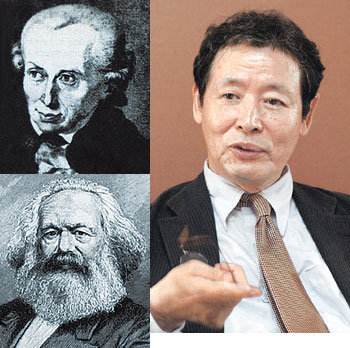Professor Takes New Look at Kant, Marx
Professor Takes New Look at Kant, Marx
Posted December. 17, 2005 10:36,

Kojin Karatani, a professor at Kinki University, originally studied economics, but changed his major to English Literature. He became not only an active literary critic but also a world renowned philosopher. He is a philosopher who combines social science with literature, and comprehends the rationalism of the West thoroughly, even though he is Asian.
Transcritique was Karatanis self-proclaimed ambitious work. Transcritique introduces a startlingly new dimension to Immanuel Kant`s transcendental critique by utilizing Kant to read Karl Marx and Marx to read Kant.
How can a materialist Marx and an idealist Kant be linked? After all, Kant is known as the father of modern liberalism while Marx is referred to as the father of modern socialism.
Professor Karatani thinks the essence of Kants philosophy, commonly known as a combination of empiricism and rationalism, is transcendentalism. Kants transcendentalist approach is the result of incessant reflection. Such a view can be acquired after repeated transposition, or criticizing empiricism from a rationalistic view and vice versa, and learning the distinct differences in light of this practice.
Karatanis insight is that this can also be applied to Marx. As those who study Marx often lose their direction between the young Marx and the adult Marx, Marx criticized left-wing Hegelians in idealistic Germany using Englands empiricism, and declared himself a Hegelian in empiricist England.
Also, as Kant emphasized his rationale by showing the limits of human reason not by directly criticizing metaphysics in The Critique of Pure Reason, Marx emphasized the importance of intervention by revealing the mechanism of capitalism, not by laying out prospects for communism in Capitalism. This is outstanding in that Marx apprehended currency in capitalism in a transcendentalist way, as Kant claimed that Subject X is in pain, on the basis of our experiences, which cannot be perceived empirically as time and space.
Karatani described the new position of Kant and Marx as a transcritique in that it is transversal, transpositional, and transcendental.
This book is unique because it further develops the understanding and presented an alternative; an associationism that can legally and nonviolently disintegrate the capital-state-nation triangle.
Chae-Hyun Kwon confetti@donga.com




![[단독]점유율 뚝-계약 줄취소…배터리도 구조조정 시사](https://dimg.donga.com/c/138/175/90/1/wps/NEWS/IMAGE/2026/01/15/133159957.1.jpg)
![[단독]“물건 보냈는데 돈 안와”… 국제정세 불안에 수출대금 8000억 떼일 위기](https://dimg.donga.com/c/138/175/90/1/wps/NEWS/IMAGE/2026/01/15/133160131.1.jpg)

